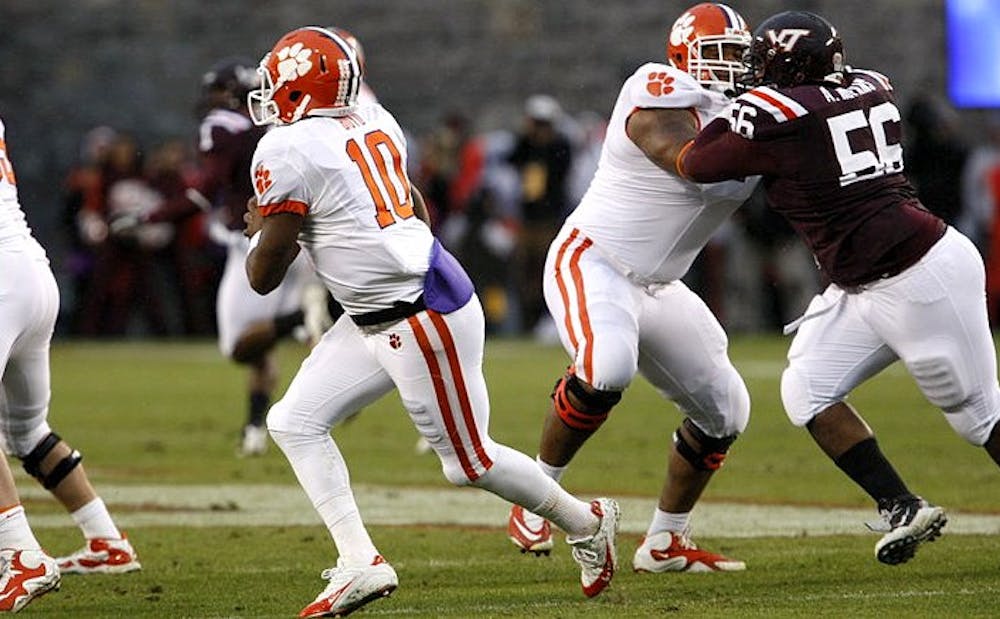After sitting out the first half of Texas A&M’s week one matchup against Rice due to a suspension agreed upon by the NCAA and his university, redshirt sophomore quarterback Johnny Manziel came off the bench to lead the Aggies to a 52-31 win against the Owls.
Manziel allegedly autographed merchandise for cash—a major no-no for the NCAA, which mandates that college athletes cannot make money off their respective sports.
Johnny Football responded to his one-half suspension with a clear message—he doesn’t think too highly of the NCAA.
It all started on Texas A&M’s second drive of the third quarter. After scrambling for eight yards and a first down, Manziel took a big hit and got off the turf jawing with a Rice player. He then started shaking his head and signing his name in the air, telling the Owl defender, ‘No, you can’t have my autograph.’
If that wasn’t a clear enough message, Manziel wasted no time reiterating his point.
On the next play, Mike Evans reeled in a 23-yard touchdown pass from Manziel to put the Aggies up 38-21. After Evans crossed the goal line, Manziel put his hands up in the air and made the ‘show me the money’ sign.
But maybe it isn’t fair to assume that Manziel’s hand gestures were in any way related to the NCAA.
Just look at the Clemson-Georgia matchup Saturday night after the Aggies had already played. Quarterback Tajh Boyd also made the ‘show me the money’ signal after an early rushing touchdown put the Tigers ahead. Was Boyd just mimicking Manziel or does he also have a problem with the NCAA?
Maybe this is just the new preferred touchdown celebration of Heisman candidates everywhere. Perhaps in week two we will see other Heisman hopefuls and touchdown-scorers across the country imploring audiences to ‘show me the money’ after crossing the goal line. Maybe it is nothing more than an innocent celebratory gesture that looks cool on TV.
But I doubt it.
Like Manziel, Boyd is the star of his school’s football program, and thus helps to contribute to a large revenue stream for his university. Like Manziel, Boyd doesn’t see a cent of that money. The two quarterbacks seem to be making clear what college athletes, mostly football and basketball players, across the country are clamoring for—a piece of the action.
It is no secret that the NCAA, collects hundreds of millions of dollars annually thanks to contracts with universities and their athletic departments. Almost all of this revenue is generated by football and men’s basketball teams as opposed to ‘non-revenue’ sports—think track and field, tennis or water polo.
To remain eligible at the collegiate level, NCAA scholarship athletes must retain their amateur status by not earning money off their sport. In return they receive a free education, food, apparel, travel to games and access to an academic support staff. This tradeoff is supposedly fair for players and universities, while also keeping moneyed interests from tainting the purity of college athletics.
But Manziel probably didn’t pick Texas A&M for its academics and probably doesn’t care about exchanging his athletic abilities, self-made brand name and physical wellbeing for a top-notch education. What he showed Saturday is that he cares about the money—and Boyd does, too.
And who can blame the two? The SEC and ACC are top football conferences stocked with athletically gifted defensive ends and linebackers who try to tear opposing quarterbacks limb from limb every week. Boyd and Manziel both risk their future athletic careers every time they step on the field, in turn producing the jaw-dropping plays and high-scoring wins that equate to big-time bucks for Texas A&M, Clemson and the NCAA.
Although the two quarterbacks are certainly not the first to bring this unfair agreement to the NCAA’s attention—see Ed O’Bannon v. NCAA—they did it Saturday in a unique way. Rather than fighting it out in a court room, Manziel, and subsequently Boyd, made their points on the field in front of tens of thousands of fans, not to mention the millions more at home watching.
Manziel may have sparked something much bigger than a trendy new way to celebrate a big score. He can be as unpredictable and uncontainable off the field as he is to opposing defenses on the field—the perfect spokesman to stick it to the all-powerful NCAA, the perfect rallying point for athletes across the country who feel the same way.
The NCAA told Johnny Football what he did is wrong. Now he is returning the favor, and the implications for college football could be much bigger than a new touchdown dance.
Get The Chronicle straight to your inbox
Signup for our weekly newsletter. Cancel at any time.

